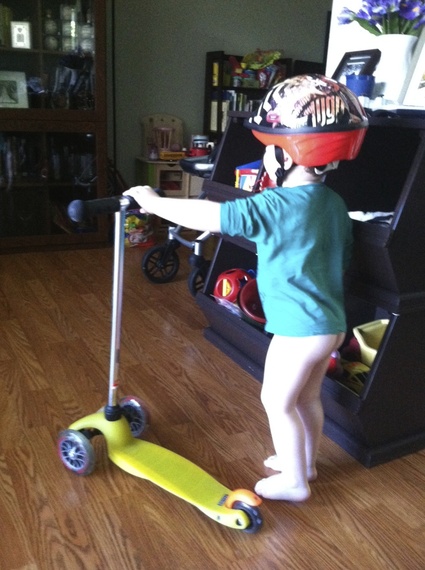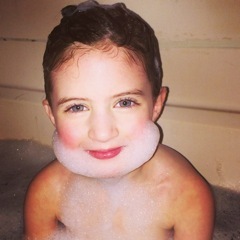There has been so much put out in the world lately about how the future will look for our children, now that they're growing up in the age of Instagram, Snapchat, YikYak, and Tinder.
These are all considered to be potentially dangerous apps, with concern weighing heavily on safety as well as the repercussions of what having photos taken or rumors started as tweens or teens may have on our children's futures. How will colleges judge our children when a Bing search turns up a salacious rumor posted on Whisper or YikYak? What will future employers think when they see our offspring -- whom we've tried mightily to raise as good, decent human beings -- after Googling them turns up photos of our little angels at a college house party?
But there is a greater threat than any of these apps -- or likely any other apps that may come along -- and that is our children's... parents. Yes, if you do the math, carry the four and divide by Pi, that's us. Many people today are writing about how so-called "mommy bloggers" along wth just typical Facebooking and Instagramming parents are the true potential culprits that will bear the brunt of the responsibility for sinking the future success of our own children. The thought is that while telling cute/exasperated/hyperbolic stories of our 3-year-old daughter asking "Why does Daddy have a tail?" or regaling tales of our newly potty-trained son wetting the bed yet again, causing us to have to launder his favorite My Little Pony sheets for the third time in a week, we are significantly altering their reputation and somehow jeopardizing their futures.
Clearly dating myself, when I've read about this concern, I always think back to Will Smith and DJ Jazzy Jeff rapping to "Parents Just Don't Understand." It is burned into my memory along with the 24 birthday parties I attended at El Torito the year I turned 11, and countless rounds of "Coke and Pepsi." The lyric seems to speak to what many of us think about this delicate topic -- "I said 'Mom, what are you doing? You're ruining my rep'/She said, 'You're only sixteen, you don't have a rep yet'."
Are we responsible for our children's reputations? Do we truly have a significant and harmful impact on them? Many people speak about keeping the anonymity of their children intact by leaving their names and photos out of articles they write, but with the technology available now, how much is that impeding the information being readily available to employers and college admissions officers? Surely, they will have my name, and in some cases my occupation, on my daughter's application -- couldn't they just Google me too, and come up on the articles I've written and put two and two together?
Even if I didn't use her name, they would quickly figure out who I'm referring to, whether I use her full name, an initial, or a cleverly-disguised alias. The point here is not to argue whether or not it is right or wrong to put photos up on Instagram, or take into consideration whether or not we should withhold the names of our children in the anecdotes we tell on Facebook, it is whether or not it will have an impact on their future.
Personally, I say not really. By the time my children are applying to college in the mid-2020s, everything will be online for everyone. For all we know, everything will already be offline by then and we will all be sporting GoogleGlass and have microchips implanted in our forearms and college interviews will be done via hologram. Instagram is the contemporary photo album, Facebook is the new archive of family stories, and YikYak is to school-aged kids what note-passing was to us. The point is that we can only control so much of what is out there to be discovered without taking ourselves completely off the grid -- a near-impossibility these days. Add to that the facts that not only are our children's parents online, in many cases, their grandparents are online as well to post pictures and brag proudly about what their little darlings have been doing as of late.
I strongly believe that what is present online about our children can indeed pose a clear and present danger to their futures. I just don't believe that these hazards lie in things like the Instagram photo I recently shared of my 5-year-old daughter in the tub with a beard made of bubbles. I don't think future employers will rethink hiring her because they're concerned she might be lackadaisical as a result of the time I tweeted that she tried to get out of going to Pre-K by proclaiming to me that her "weight was hurting" her that day.
I do believe that our responsibility to protect our children's futures should be concentrated much more heavily on instilling that awareness and culpability within them. It will not be silly stories about them in Kindergarten that will make those people who wield the power over their professional and collegiate careers take pause before sending out acceptance or offer letters to them -- it will be the things that our children potentially post about themselves. Making a tacit assumption about basic parenting and common sense here, it is doubtful that people are going to be posting embarrassing things about their adorable and zany offspring once those kids are old enough to have Facebook accounts, cell phones, and Twitter handles of their own. There will come a time, when it will feel wrong to post these stories, as though we are invading our children's privacy -- either because we find ourselves hesitating before posting something, or because our child expressly tells us they don't want us to anymore. And we should respect that.
But we need to teach them the importance of ensuring that they respect themselves, as well. We need to implore them to consider their futures; as far off as they may seem at the time, before posting, or tweeting, or whatever the next technological verb may be coming down the pike. We need to clearly and plainly explain to them the permanence of what they put out into the world about themselves, and the inherent dangers -- both immediate and otherwise -- in how it potentially may be used to harm them. There have also been plenty of experimental posts by parents and teachers we can show to our children, that have successfully gone viral in their attempts to showcase how far-reaching the Internet can be. Teaching these lessons, and instilling those values are our greatest responsibilities for ensuring that our children have their privacy and futures protected.
Throughout our valiant attempts to protect our sons and daughters, it's much less important whether or not the former Fresh Prince of Bel Air had it right when he claimed that "parents just don't understand." What should take precedence is ensuring that our children do.
This piece originally appeared on Dot Complicated where Jamie is a Regular Contributor.

